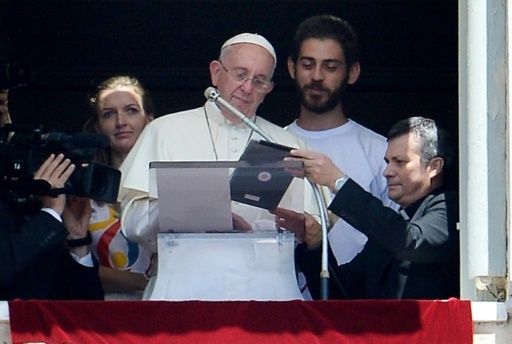Updated 1544 GMT (2244 HKT) July 14, 2015
(CNN)Pope Francis defended himself against critics who accuse him of preaching class warfare, saying that he's just applying Catholic teachings to an economic system that is highly polarized between the rich and poor.
"It is I who follow the church!" the Pope said. "It's not a fight against an enemy, it's catechism." The catechism is the Catholic Church's summary of doctrine and social teachings.
The Pope was speaking at a press conference on the flight back to Rome from South America, where he had
railed against the relentless pursuit of profit and said human lives are being sacrificed on the
"altar of money."
Francis also said that he has heard criticism of his economic messages, particularly the lengthy environmental manifesto released last month, and will respond when he has had time to study the critiques. He plans to visit Washington, New York and Philadelphia this September.
Here are other highlights from the Pope's press conference on Sunday evening, with questions from various reporters on the plane.
Q: Your Holiness, one of the strongest messages of this trip was that the global economic system imposes a profit mentality at any cost, to the detriment of the poor. This is perceived by Americans as a direct criticism of their system and their way of life. How do you respond to this perception, and what is your evaluation of the impact of the United States in the world?
A: What I said, that phrase, it's not new. I said in (the apostolic letter)
"Evangelii Gaudium": This economy kills. ... And I said it in (the encyclical)
"Laudato Si."
It's not a new thing, this is known. ... I heard that there were some criticisms from the United States. I heard about it but I haven't read about it, I haven't had the time to study this well, because every criticism must be received, studied and then dialogue must ensue.
Q: Now you will go the United States. ... You must have some thoughts about the nation.
A: No, I have to begin to study now.
Q: I have a father who is younger than you and has half your energy. ... What is your secret?
A: What is your drug is what he means, that's the question! (Laughter.) ... Mate helps me but I have never tasted coca.
Q: Holy Father, on this trip, we've heard so many strong messages for the poor, also many strong, at times severe messages for the rich and powerful. But something we've heard very little was a message for the middle class, that is, people who work, people who pay their taxes, so "normal people." My question is why ... are there so few messages of the middle class? If there were such a message, what would it be?
A: Thank you so much. It's a good correction, thanks. You are right. It's an error of mine not to think about this. I will make a comment but not to justify myself. You're right. I have to think a bit.
The world is polarized. The middle class becomes smaller. The polarization makes the (difference between) rich and the poor big. This is true. And perhaps this has brought me not to take account of this, no?
Some nations are doing very well, but in the world in general the polarization is seen. And the number of poor is large. And why do I speak of the poor? Because they're at the heart of the Gospel. I always speak from the Gospel on poverty, no? It's not that it's sociological.
Then, on the middle class, there are some words that I've said, but a little in passing. But the common people, the simple people, the worker, that is a great value, no? But, I think you're telling me about something I need to do. I need to delve further into this.
Q: Your Holiness, you present yourself as the new world leader of alternative politics. I would like to know: Why do you support so strongly popular movements and not so much the business world?
A: The popular movements are a big reality, all over the world. What I gave them is the social doctrine of the church, just as I do with the business world. If you look back at what I told the popular movements, it comes from the church's social doctrine.
Q: What do you think of people taking selfies at Mass and that young people want to take with you?
A: What do I think of it? I feel like a great-grandfather! It's another culture. Today as I was taking leave (from Asuncion, Paraguay) a policeman in his 40s asked me for a selfie! I told him you're a teenager! It's another culture -- I respect it.
....

